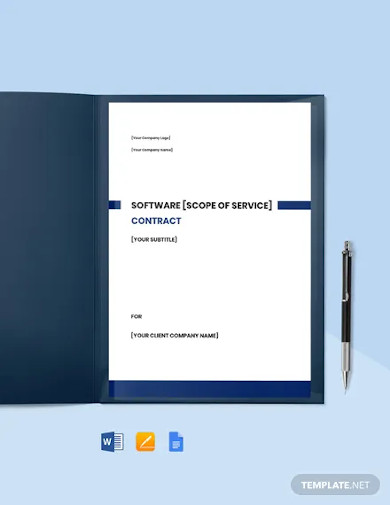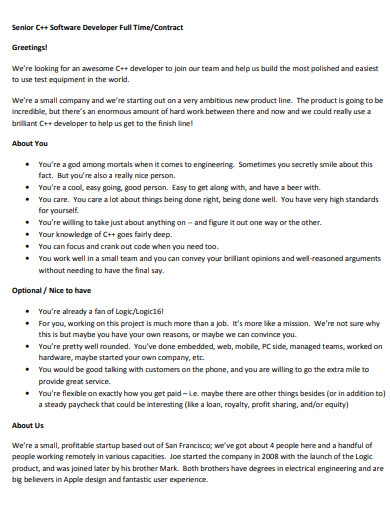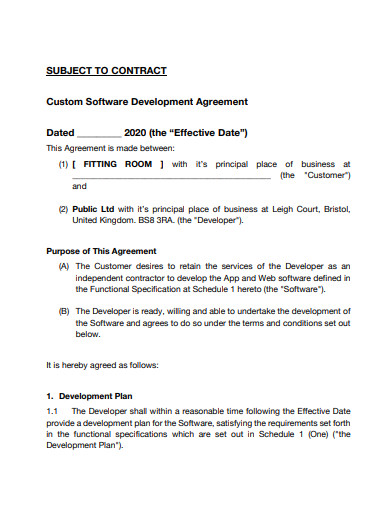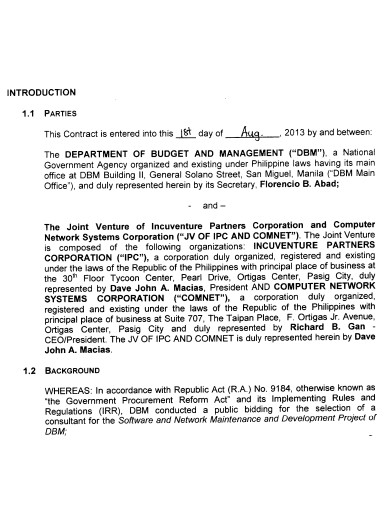Working in the field of software development is no easy feat; whether you are a freelancer software developer or running a software development agency, you can expect to face many challenges and risks. For example, you need to constantly update the software and technology of a certain project, handle intellectual property issues, and deal with clients who have no clue on how the final product will be created or do not meet your requests right away. Since your work is complex, it’s the best idea to create a contract whenever you work with different clients. A contract can protect your rights in intellectual property, for example, and you can have some control over the working conditions that you have while being committed to a client’s project. This article will guide you on how to make a software developer contract.
3+ Software Developer Contract Samples
1. Software Developer Contract

2. Sample Software Developer Contract
3. Custom Software Developer Contract
.4. Simple Software Developer Contract
What is a Software Development Contract?
A software developer contract or also known as a service contract is a written agreement between the client and the software developer regarding the expectations and responsibilities of both parties in a project or task involving software development. This contract defines the terms and conditions regarding the project scope and cost, intellectual property rights, confidentiality, success metrics, timeframes, and warranties. This is helpful to protect the developer from ruining their business and to also earn profit faster.
Details to Include in a Software Developer Contract
1. Service Description and Project Scope
Clearly outline what the client expects from you regarding this project. For example, put specific details regarding the development of specific features, the number of allowed revisions, and maintenance services required to do the project efficiently. Prepare detailed project specifications and attach them to the contract, if applicable. You also need to establish tools and processes for the project to let the client know what will happen. Since the process is likely to have changes and revisions, include an explanation regarding any possible changes to the project scope and the procedure that may happen.
2. Time and Cost
You can either define the fixed cost and timeframe of the whole project or have a flexible cost and time frame for the parties to decide on these matters. State the budget and development stages with milestones and dates. Since you can’t always assure that all things planned will go along smoothly and without any hitches, you also need to Take into account that delays may happen.
3. Acceptance Testing and Delivery Period
This is the period during which the client can access the software and test whether it meets their requirements and specifications. You can state the delivery of the entire project to the client. Your client will either approve the software or deny it. Ask the clients which areas need to be improved if they are rejected.
4. Warranties and Liabilities
Along with basic warranties like keeping contract terms and deadlines, you also need to provide the client an inventory of third-party code, guarantee no backdoor access, and comply with policies you’ve set for the project. You can also limit your liability for losses and damages your client will face due to software used by adding a liability clause.
5. Intellectual Property Terms
Intellectual property is also an important part of the contract. Define the ownership rights of yours and your client for source code, design, patents, copyright, and trade secrets.
6. Confidentiality Terms
The contract should also define what information is considered confidential and determine each party’s responsibility for disclosing sensitive information.
7. Success Metrics
Ensure that the success metrics should avoid broad terms and vague language by setting concise and clear measurable metrics to measure the success of the project. This should be done to avoid misunderstandings and arguments between both parties.
8. Pricing and Nilling
Include the exact rates of your service fees, or price ranges when a fixed price is not set. Define how, when, and where the billing process occurs. You can also attach a payment schedule to the contract and give it to the client to help prevent payment delays and penalties.
9. Other Legal Terms to Include
- Support and maintenance: Determine whether the client may need extra support and maintenance in the project. Agree on the terms and costs.
- Order changes: If the client doesn’t have a clear vision of the final product, include a section in the contract for order changes.
- Dispute resolutions and termination: Define how you will resolve issues (whether through mitigation, litigation, or jurisdiction) and what can cause will terminate the contract.
FAQs
What are the types of development contract?
- Time and Materials Contract: This type of contract requires a client to pay the developer according to the number of hours they worked.
- Fixed Budget Contract: This type of contract outlines the acknowledgment of both the developer and client that there is a targeted budget for the project and that issues may arise if the budget is exceeded.
- Capped Budget with Bonus Contract: This type of contract is the same as a fixed budget contract, except that it offers an incentive (usually monetary) if the developer delivers their task on an earlier date and without exceeding the budget provided.
What skills do software developers need?
The skills that software developers should have and cultivate are:
- Mathematical skills
- Problem-solving skills
- Extensive knowledge in programming languages
- Organizational and time management skills
- Keen attention to detail
How long does it take to become a software developer?
It can take from three months to four years to become a software engineer. The level of expertise will largely depend on your technical experience, professional background, and career path.
A well-drafted contract can protect you from losses within the work that you’re focusing on. Furthermore, it can also become a good starting point for long-term collaboration with your client if things go well and the project is underway. To help you get started making the contract, download our free sample templates above to use as your guide!
Related Posts
Sample Excuse Letter for School
Feature Writing Samples
FREE 10+ Security Guard Contract Samples in PDF | MS Word
FREE 10+ Option to Purchase Agreement Samples in MS Word | Apple Pages | PDF
FREE 26+ Curriculum Form Samples in MS Word | PDF
FREE 20+ Cleaning Service Proposal Samples in PDF | MS Word
FREE 29+ Sample Loan Application Form Templates in MS Word | PDF
FREE 10+ Event Venue Contract Samples in PDF | MS Word | Pages | Google Docs
FREE 10+ SBAR Samples in PDF | DOC
FREE 12+ Music Band Contract Templates in PDF | MS Word
FREE 10+ HVAC Maintenance Contract Samples in PDF | MS Word
FREE 10+ Social Media Marketing Contract Samples in MS Word | PDF
FREE 10+ Wholesale Assignment Contract Samples in PDF
FREE 18+ Financial Proposal Samples in PDF | MS Word | Google Docs | Pages
FREE 10+ Feasibility Study Samples in PDF



